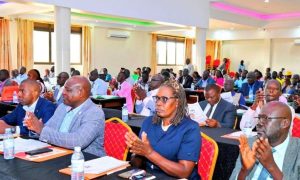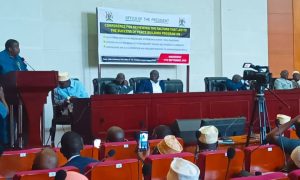Uganda marked its inaugural National Education Day at the Kololo ceremonial ground, drawing together diverse stakeholders ranging from parents, teachers, and students to political leaders, technocrats, and development partners. The event coincided with the commemoration of 27 years of Universal Primary Education (UPE), serving as a platform for reflection on the progress and challenges within the education sector.
Despite strides made in the past three decades, the consensus among participants was clear: inadequate funding remains a significant obstacle hindering the sector’s advancement.
Alex Mukisa, a sixth-grade pupil from Nakivubo Blue Primary School, lamented the prevailing challenges, citing shortages of classrooms, teachers, and essential educational materials. Mukisa articulated a common sentiment that increased government funding could address these pressing issues effectively.
Indeed, the education system grapples with a myriad of challenges, including overcrowded classrooms in rural areas, leading to suboptimal learning conditions. Jamil Mugumya, a teacher, underscored the critical need for augmented funding, particularly through the capitation grant provided to schools. He highlighted that the current allocation of 17,000 shillings per learner falls short of adequately supporting quality education delivery.
Echoing these sentiments, the National Planning Authority (NPA) advocated for a substantial increase in funding allocation per learner, aligning with factors such as enrollment rates and school performance metrics. Jan Sadek, the EU Ambassador to Uganda, emphasized the pivotal role of education investment in enhancing human capital development. He cautioned that Uganda’s current allocation to education falls below the benchmark recommended by the Education 2030 Framework for Action.
Sadek stressed the importance of prioritizing funding for Early Childhood Development (ECD), citing its foundational role in learners’ future academic success. He urged the government to introduce Universal Early Childhood Education (ECE) and allocate resources accordingly to ensure comprehensive preparation for primary schooling.
In response, John Muyingo, the State Minister for Education and Sports, reaffirmed the government’s commitment to bolstering funding for education. Plans are underway to allocate additional resources to achieve Universal Primary Education (UPE) and implement the Universal Secondary Education (USE) policy. Muyingo underscored the complementary role of parents and learners in supporting the sector’s advancement.
Cabinet’s approval of a substantial budget increase for UPE signals a proactive step towards addressing staffing deficiencies and enhancing local government oversight of schools. President Yoweri Museveni reiterated the government’s unwavering commitment to education as a cornerstone of national development.
As Uganda charts its educational trajectory, increased funding emerges as a linchpin for realizing the sector’s transformative potential and nurturing a generation equipped to propel the nation forward.


























